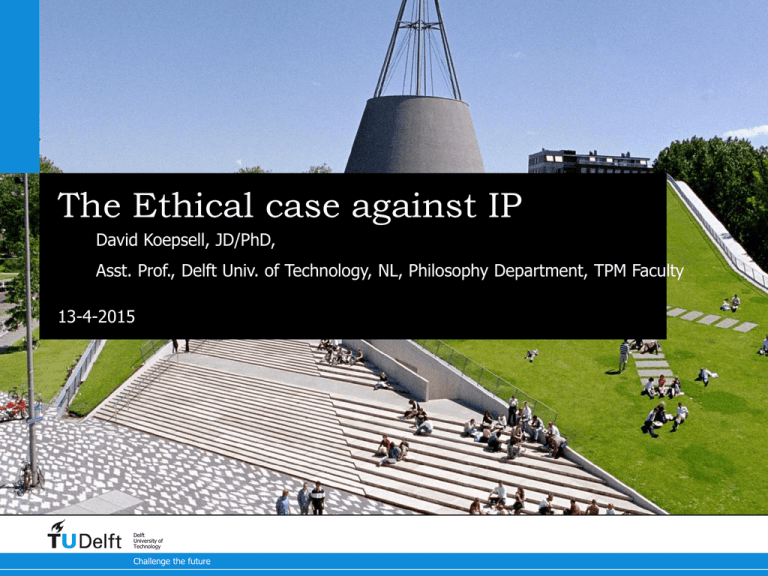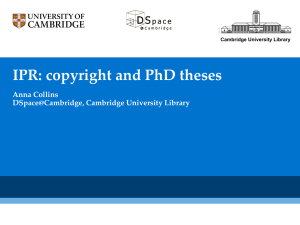The Ethical Case Against IP
advertisement

The Ethical case against IP David Koepsell, JD/PhD, Asst. Prof., Delft Univ. of Technology, NL, Philosophy Department, TPM Faculty 13-4-2015 Delft University of Technology Challenge the future Axiom 1 We have fundamental rights to autonomy of our minds and bodies The Ethical Case Against Intellectual Property 2 Axiom 2 We have fundamental rights to freedom of expression (consistent with Mill’s “liberty principle”) The Ethical Case Against Intellectual Property 3 Premise 1 All man-made objects intentionally produced are “expressions” and these are the only subjects of IP laws The Ethical Case Against Intellectual Property 4 The Ontology of Cyberspace Open Court (2000) Cyberspace presented a unique problem: two previously mutually-exclusive categories were both applied to its objects This implied either: a) cyberspace is a unique “hybrid” object, or b) the categories of patent and copyright have been incorrectly drawn The Ethical Case Against Intellectual Property 5 The Ontology of Cyberspace Cyberspace is not ontologically unique. The only thing distinguishing its objects from Jacquard looms, steam engines, the telegraph, and smoke signals is speed. The differences are of degree, not kind. The Ethical Case Against Intellectual Property 6 The Ontology of Cyberspace The flexibility of the medium of cyberspatial objects revealed the faulty ontology of Intellectual property, which distinguishes between types of expressions (ideas made manifest outside of minds) that are either: Primarily utilitarian (patents) or primarily aesthetic (copyrights) The Ethical Case Against Intellectual Property 7 Premise 2 Rights of ownership stem from brute facts of possession and laws are “just” when grounded in brute facts The Ethical Case Against Intellectual Property 8 Property vs. “Intellectual Property” Rights to land and moveables stem from pre-legal “brute facts.” Actual possession and indicia of possession give rise to just claims of legal ownership. Exclusivity and the necessity of force or violence for dispossession make claims of legal ownership “grounded” (see Ontology of Cyberspace, and Reinach’s Apriori Foundations of the Civil Law) The Ethical Case Against Intellectual Property 9 Property vs. “Intellectual Property” There is no way to exclusively possess an expression type (as opposed to token), nor does dispossession (reproduction of the type) of an expression type once expressed require force or violence. Nor does it impinge upon individual autonomy to do so. Unlike land and moveables, intellectual property laws are not “grounded” in any brute facts of possession. The Ethical Case Against Intellectual Property 10 Property vs. “Intellectual Property” Just laws are grounded in brute facts. The positive law may be unjust if it conflicts with “grounded” laws. E.g., if laws were passed to make private property unlawful, those laws would be unjust. (see Ontology of Cyberspace, and Reinach) Intellectual property is a pragmatic response to a perceived economic need. It is not a “natural right” nor is it “grounded.” The Ethical Case Against Intellectual Property 11 Premise 3 There are parts of the world that cannot be justly owned The Ethical Case Against Intellectual Property 12 Who Owns You? : genomes and commons If IP law is a creature of the positive law, ungrounded in brute facts, it may be unjust where it conflicts with “grounded” rights. A critical inquiry is: are there parts of the world for which the granting of IP rights conflicts with other, grounded rights? Example: genomes The Ethical Case Against Intellectual Property 13 Who Owns You? : genomes and commons A gene is the arrangement of nucleotides that codes for a protein. Its action involves the creation of proteins by mRNA, which as it creates the proteins, reads the beginning and end of the gene, and leaves out the introns. This is the same mechanism employed by humans when we make intentionally create cDNA (and then try to patent it). The Ethical Case Against Intellectual Property 14 Who Owns You? : genomes and commons A patent on cDNA, I argue, is not different than the patent on the gene itself as there is nothing new about the cDNA. Nature devised long ago the methods of reading genes and making proteins. cDNA is thus not novel and not properly patentable. (ultimately, though, my “commons” argument trumps this). The Ethical Case Against Intellectual Property 15 Who Owns You? : genomes and commons There are two types of commons: “commons by choice” and “commons by necessity” Commons by choice involve parts of the world that could be possessed, but for which we make conscious decisions to keep them in the public domain. (e.g national parks, international waters) (Who Owns You, ch. 7) The Ethical Case Against Intellectual Property 16 Who Owns You? : genomes and commons Commons by necessity are parts of the world that cannot be possessed or enclosed in any meaningful sense. Examples include: all of the oxygen in the atmosphere, bands of the radio spectrum, laws of nature (f=ma, e=mc^2, etc.) (Who Owns You, ch. 7) The Ethical Case Against Intellectual Property 17 Who Owns You? : genomes and commons The human genome is a constantly evolving object that involves every member of the species, and is, I argue, a commons by necessity, like outer space, the atmosphere, sunlight, laws of nature, and radio spectra. We have rights in common to these objects. These common rights supercede conscious decisions about how to use them. Note this is not a pragmatic argument, but an ontological one regarding the nature of the underlying objects. It differs significantly from arguments regarding “anticommons.” The Ethical Case Against Intellectual Property 18 Who Owns You? : genomes and commons Discovering the nature of “commons by necessity” like a genome, replicating their processes, and using them to our personal benefit cannot ethically be done to the exclusion of others. Granting exclusionary rights to discoverers of genes that are part of that genome interferes with our common rights as beneficiaries and possessors of parts of the human genome. The Ethical Case Against Intellectual Property 19 Who Owns You? : genomes and commons Myriad, for instance, when it uses its patent on the BRCA1 and 2 genes that are linked to breast cancer, prohibits meanwhile the replication by others of the genes themselves. It has sent cease and desist letters to scientists who were doing lab work on those genes. (see complaint in ACLU and PubPat v. Myriad) The Ethical Case Against Intellectual Property 20 Who Owns You? : genomes and commons I argue that it is our right in common to explore and investigate our individual genomes, as well as the human genome, unhindered by claims of others. What Myriad "owns" through its patents is a right to stop you from doing that, and they have exercised that right to our common detriment. The Ethical Case Against Intellectual Property 21 Premise 4 IP rights are exclusionary rights that prevent the unauthorized expression of protected idea types. The Ethical Case Against Intellectual Property 22 IP and expressions revisited While an author or inventor “owns” their IP, they can exclude others from making unauthorized reproductions of their expressions. They can receive royalties for any reproduction made. They can enjoin the expression by others of their protected idea types. The Ethical Case Against Intellectual Property 23 IP and expressions revisited The law allows many types of restrictions on expression, typically to prevent physical harms or incitement of physical harms. IP laws are government restrictions on expression having nothing to do with physical harms or incitement. The Ethical Case Against Intellectual Property 24 IP and expressions revisited Expressed ideas belong to the category “commons by necessity,” as there is no meaningful way of possessing or enclosing them. The Ethical Case Against Intellectual Property 25 IP and expressions revisited Besides the ethical problems of governmentally curtailing free expression, IP as a category of law is an attempt to enclose a “commons by necessity.” IP rights prevent the free use of expressed ideas, which are a commons by necessity like radio spectra, genes, and laws of nature. The Ethical Case Against Intellectual Property 26 IP and expressions revisited IP laws in general do what gene patents do: they attempt to enclose an unencloseable space that is not just a commons by choice, but one by necessity. Positive laws may be unjust where they impinge on “grounded” rights. Our shared rights to commons by necessity are grounded in the brute facts of their unencloseability. The Ethical Case Against Intellectual Property 27 IP and expressions revisited Expressed ideas are like genes… it isn’t so much that “they want to be free” They just are. And attempts to enclose them are as morally wrong as attempts to enclose genes, sunlight, oxygen, or any other commons by necessity. The Ethical Case Against Intellectual Property 28 example Take, for instance, the lack of an “independent discovery” exception in patent law The Ethical Case Against Intellectual Property 29 Thanks! http://www.davidkoepsell.com The Ethical Case Against Intellectual Property 30







